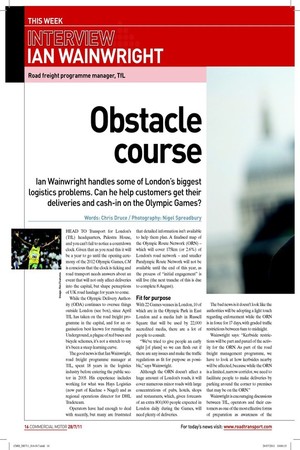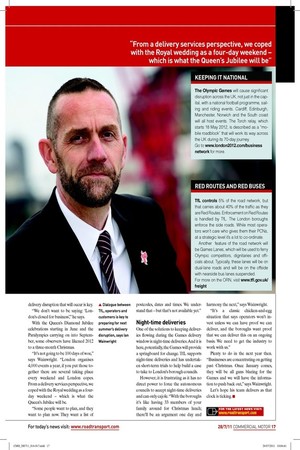Obstacle course
Page 12

Page 13

If you've noticed an error in this article please click here to report it so we can fix it.
Ian Wainwright handles some of London’s biggest logistics problems. Can he help customers get their deliveries and cash-in on the Olympic Games?
Words: Chris Druce / Photography: Nigel Spreadbury
HEAD TO Transport for London’s (TfL) headquarters, Palestra House, and you can’t fail to notice a countdown clock. Given that as you read this it will be a year to go until the opening ceremony of the 2012 Olympic Games, CM is conscious that the clock is ticking and road transport needs answers about an event that will not only affect deliveries into the capital, but shape perceptions of UK road haulage for years to come.
While the Olympic Delivery Authority (ODA) continues to oversee things outside London (see box), since April TfL has taken on the road freight programme in the capital, and for an organisation best known for running the Underground, a plague of red buses and bicycle schemes, it’s not a stretch to say it’s been a steep learning curve.
The good news is that Ian Wainwright, road freight programme manager at TfL, spent 18 years in the logistics industry before entering the public sector in 2005. His experience includes working for what was Hays Logistics (now part of Kuehne + Nagel) and as regional operations director for DHL Tradeteam.
Operators have had enough to deal with recently, but many are frustrated that detailed information isn’t available to help them plan. A inalised map of the Olympic Route Network (ORN) – which will cover 175km (or 2.6%) of London’s road network – and smaller Paralympic Route Network will not be available until the end of this year, as the process of “initial engagement” is still live (the next tranche of this is due to complete 8 August).
Fit for purpose
With 22 Games venues in London, 10 of which are in the Olympic Park in East London and a media hub in Russell Square that will be used by 22,000 accredited media, there are a lot of people to consult.
“We’ve tried to give people an early sight [of plans] so we can lesh out if there are any issues and make the trafic regulations as it for purpose as possible,” says Wainwright.
Although the ORN doesn’t affect a huge amount of London’s roads, it will cover numerous minor roads with large concentrations of pubs, hotels, shops and restaurants, which, given forecasts of an extra 800,000 people expected in London daily during the Games, will need plenty of deliveries. The bad news is it doesn’t look like the authorities will be adopting a light touch regarding enforcement while the ORN is in force for 17 days, with graded trafic restrictions between 6am to midnight.
Wainwright says: “Kerbside restrictions will be part and parcel of the activity for the ORN. As part of the road freight management programme, we have to look at how kerbsides nearby will be affected, because while the ORN is a limited, narrow corridor, we need to facilitate people to make deliveries by parking around the corner to premises that may be on the ORN.” Wainwright is encouraging discussions between TfL, operators and their customers as one of the most effective forms of preparation as awareness of the delivery disruption that will occur is key. “We don’t want to be saying: ‘London’s closed for business’,” he says.
With the Queen’s Diamond Jubilee celebrations starting in June and the Paralympics carrying on into September, some observers have likened 2012 to a three-month Christmas.
“It’s not going to be 100 days of woe,” says Wainwright. “London organises 4,000 events a year, if you put those together there are several taking place every weekend and London copes. From a delivery services perspective, we coped with the Royal wedding as a fourday weekend – which is what the Queen’s Jubilee will be.
“Some people want to plan, and they want to plan now. They want a list of postcodes, dates and times. We understand that – but that’s not available yet.”
Night-time deliveries
One of the solutions to keeping deliveries lowing during the Games delivery window is night-time deliveries. And it is here, potentially, the Games will provide a springboard for change. TfL supports night-time deliveries and has undertaken short-term trials to help build a case to take to London’s borough councils.
However, it is frustrating as it has no direct power to force the autonomous councils to accept night-time deliveries and can only cajole. “With the boroughs it’s like having 33 members of your family around for Christmas lunch; there’ll be an argument one day and harmony the next,” says Wainwright.
“It’s a classic chicken-and-egg situation that says operators won’t invest unless we can have proof we can deliver, and the boroughs want proof that we can deliver this on an ongoing basis. We need to get the industry to work with us.” Plenty to do in the next year then. “Businesses are concentrating on getting past Christmas. Once January comes, they will be all guns blazing for the Games and we will have the information to push back out,” says Wainwright.
Let’s hope his team delivers as that clock is ticking. n











































